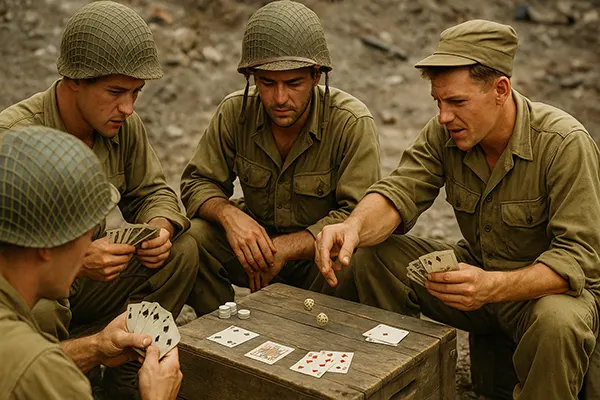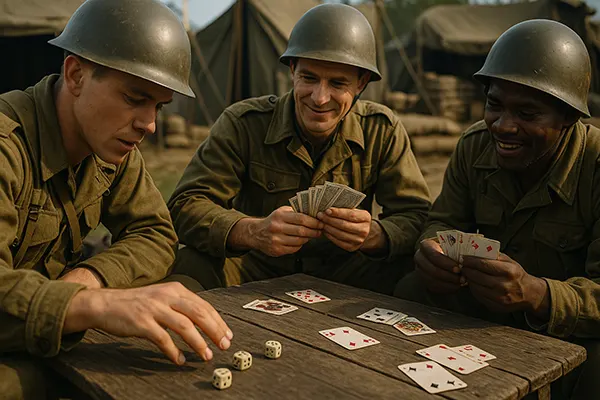Throughout history, soldiers have faced extreme conditions: psychological strain, boredom between battles, and the constant spectre of mortality. Amidst this chaos, gambling emerged not merely as entertainment but as a deeply ingrained ritual — a psychological shield, a test of nerve, and sometimes a mechanism of control. From the trenches of the First World War to the jungles of Vietnam, games of chance have long accompanied military campaigns.
Games of Survival and Sanity
In the brutal theatre of war, particularly during long periods of inactivity, gambling became a coping strategy. Soldiers, often stuck in damp trenches or barren outposts, turned to card games and dice as mental escape routes. These activities weren’t only about winning rations or money — they were about creating a fleeting sense of normality amidst the madness.
British and French troops in World War I, for example, frequently organised impromptu poker nights using cigarette packs or matchsticks as currency. While the games offered distraction, they also provided structure — a set of rules to cling to in a world where chaos ruled.
In many cases, these games helped forge camaraderie. Gambling allowed men to bond, share stories, and forget, if just for an hour, the uncertainty of the next day. Even high-ranking officers sometimes joined, understanding the psychological benefit such rituals brought to their men.
The Psychological Need for Risk
At its core, gambling taps into human psychology — the allure of risk, the thrill of winning. For soldiers, this mirrored the constant risks they faced on the battlefield. The dice roll or card flip mimicked the life-or-death choices made daily. For some, gambling became a ritualised way of facing fear in a controlled environment.
Psychologists studying veterans have noted that chance-based games served as a way to reclaim agency. When life was governed by the whims of war, rolling a die allowed soldiers to momentarily take control. It wasn’t unusual for troops to bet on anything from card hands to who might survive the next patrol.
This deep psychological function underlines why gambling persisted across conflicts, despite efforts by some military commands to curb it. The games weren’t mere pastimes — they were reflections of the war experience itself.
Control, Discipline and Subversion
While some armies discouraged gambling, others saw value in it. Commanders in both World Wars occasionally tolerated or even encouraged controlled gambling zones, understanding that a mentally occupied soldier was less likely to fall into disciplinary issues or insubordination.
In World War II, American GIs often played craps and poker between missions. The US military, recognising the inevitable, sometimes turned a blind eye. Even in prisoner-of-war camps, gambling thrived. It was both rebellion and order — a way to maintain morale while resisting captor-imposed monotony.
However, gambling also carried risks. Addiction, disputes and cheating were common. In the Soviet Army during the Afghanistan conflict (1979–1989), commanders reported that gambling sometimes led to violent altercations, forcing tighter regulation. Yet even strict bans couldn’t fully suppress the urge to play — the games simply moved underground.
Regulated vs. Rogue Betting
In some military cultures, gambling was semi-formalised. The British army during WWII, for example, occasionally allowed units to organise tournaments. In contrast, rogue gambling rings also proliferated, particularly in rear zones or after major battles when looted currency or valuables were available.
The Viet Cong and North Vietnamese Army reportedly gambled using rice, ammunition, or even captured goods. This type of betting had higher stakes, sometimes tied to personal survival. It showed how ingrained the gambling instinct became — regardless of ideology or resources.
Interestingly, even military chaplains and medics occasionally participated, revealing how ubiquitous and socially accepted the practice became in specific contexts. As long as the chain of command remained intact, gambling was often overlooked — if not quietly encouraged.

Legacy and Cultural Echoes
Today, the legacy of military gambling persists in the cultural memory of many nations. Veterans’ memoirs are peppered with stories of high-stakes games, lucky dice, and tragic wagers. These anecdotes form part of the wider folklore of war — capturing both the levity and darkness of soldiers’ experiences.
Modern armies, like those of the UK and US, now run awareness campaigns to combat problem gambling among returning service members. The link between combat stress and addictive behaviours is now well-documented, and veteran support services often address gambling as part of broader psychological care.
Yet, for many veterans, gambling remains an innocuous symbol of resilience — a habit born not out of recklessness, but necessity. It offered, at critical moments, a way to feel alive when everything else was uncertain.
From Battlefield to Memory
Films and novels often depict war gambling scenes, cementing the trope in public imagination. Whether it’s Allied soldiers throwing dice in an Italian villa or guerrillas betting on survival odds in remote jungle hideouts, the image resonates.
Military museums in Canada, the UK, and Australia now feature wartime gambling artefacts — decks of cards, homemade dice, and logs of prisoner-of-war games. These items tell personal stories of men who, in their own way, defied war’s dehumanisation through play.
As long as armed conflict exists, so too will the soldier’s need to find meaning, distraction and humanity through games — even games of chance. The dice, after all, offer not just odds, but hope.

